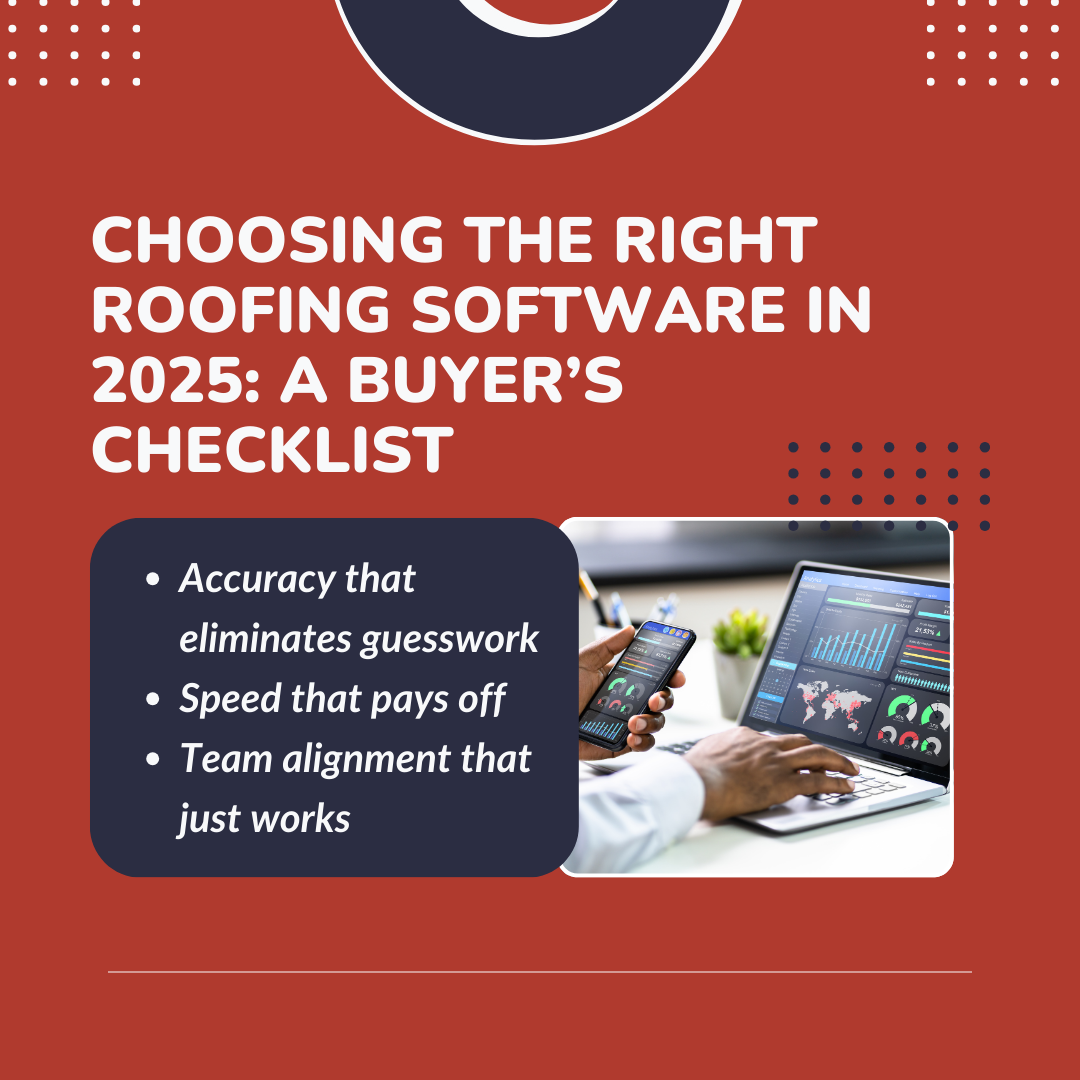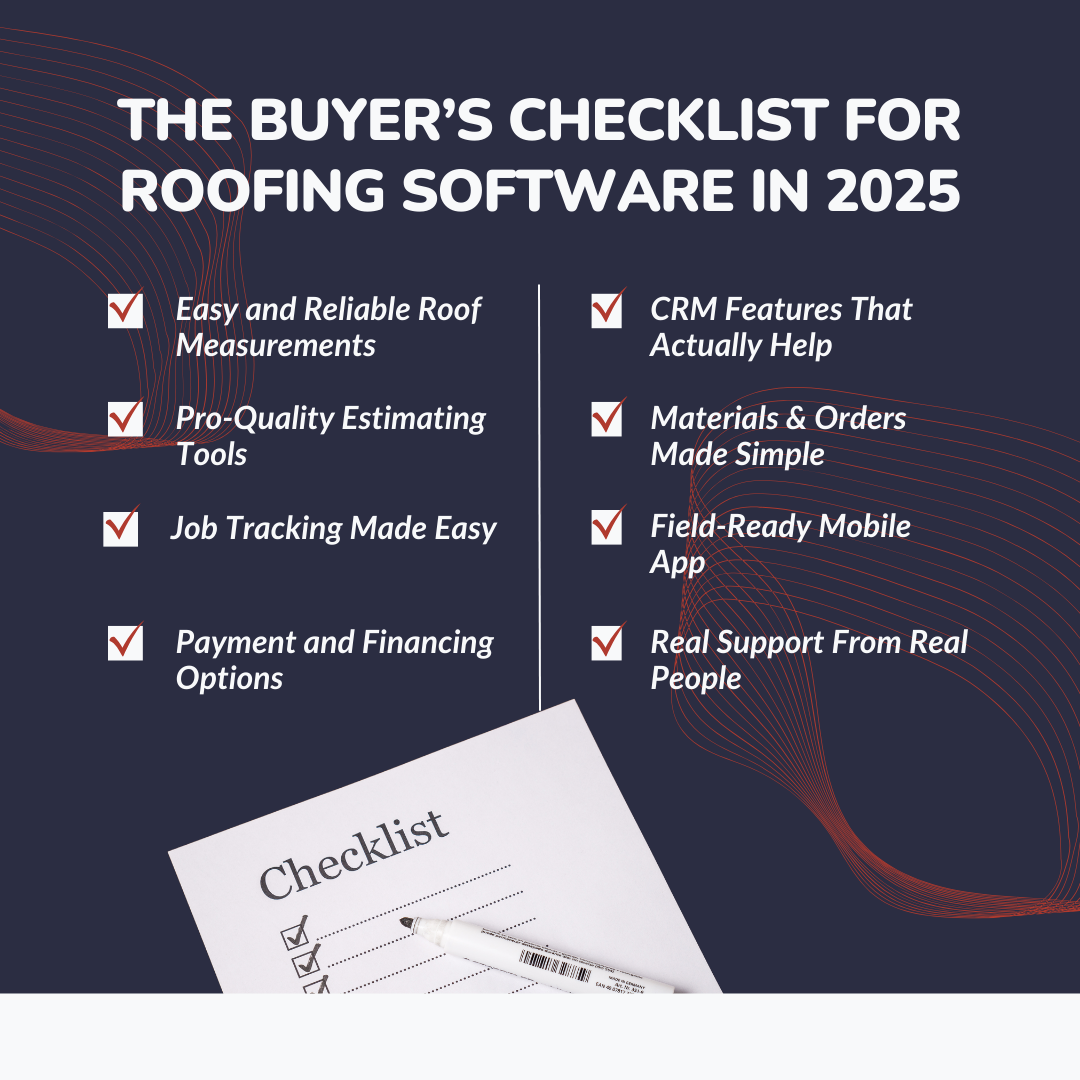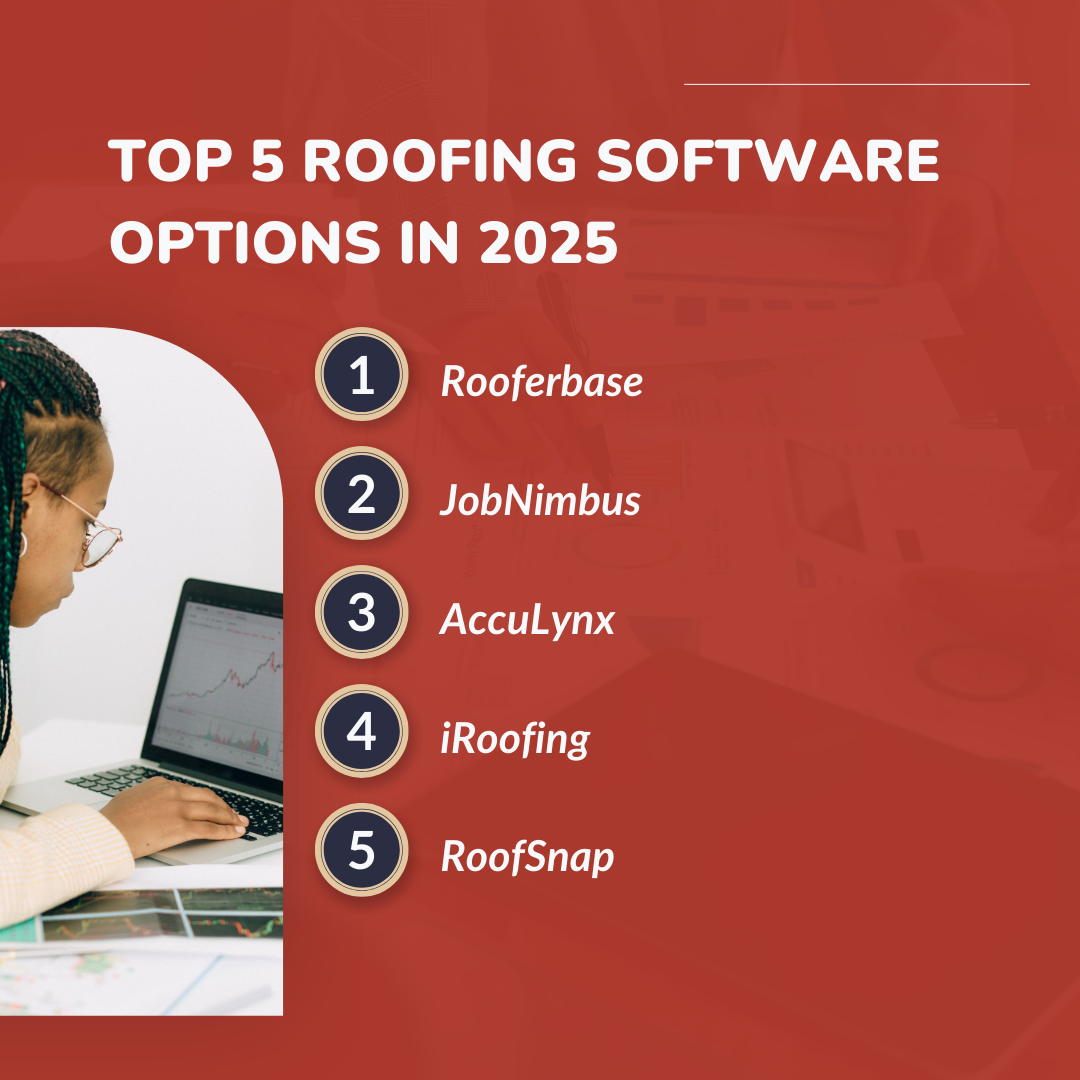June 3, 2025
"I was tired of phone tag, paperwork piles, and guessing measurements..."
That’s what a third-generation roofing contractor said about the need for accurate measurements. His father taught him the ropes, but in 2025, tradition alone won’t cut it.
The pressure is real: more jobs, higher customer expectations, and a workforce juggling routine tasks like materials, estimates, site photos, sales, and still calling in updates at the end of a 12-hour day.
If you're running a roofing business or managing roofing projects, commercial or residential, you’re probably nodding along.
This blog is for you, especially if you want to streamline your sales process. It’s not just about software. It’s about sanity. It’s about saving time, making more money, and finally having a system that works as hard as you do.
Key Takeaways
- Learn how to choose roofing software that fits your business, not the other way around.
- Understand which features truly impact accuracy, speed, and team coordination.
- Discover why mobile access and built-in CRM are now must-haves.
- See how the right tools can boost cash flow and reduce material waste.
- Get a clear checklist trusted by roofers to make smart software choices in 2025.
Why Roofing Businesses in 2025 Deserve Better Tools
The roofing industry isn’t what it used to be, it’s faster, more digital, and increasingly competitive. Your customer expects instant roof estimates, your crew wants mobile access, and your office staff? They’re done with spreadsheets.
Whether you're scaling your roofing company or simply trying to stay afloat, investing in the right tools can transform everything, not just the job site but also your peace of mind.
What Roofing Software Can Actually Do for You

1. Accuracy that eliminates guesswork
Tired of second-guessing measurements or re-ordering materials because of miscalculations?
Good roofing software uses aerial and digital tools to generate precise, affordable roof measurement reports and accurate roofing estimates, no climbing, no back-and-
forth.
You get reliable numbers you can trust, service details, which means fewer costly errors and more confident estimating from day one.
2. Speed that pays off
Time is money in roofing, and software helps you win both.
Imagine generating professional estimates and proposals using the best roofing software in minutes, not hours.
Instant estimators, automated notifications, and customizable templates let you respond to leads quickly, send quotes faster, and follow up without lifting a finger.
The result? More jobs won, less time wasted.
3. Team alignment that just works
No more digging through texts, spreadsheets, or missed calls. Roofing software brings your entire team, sales, office staff, and on-site crews onto the same platform.
Job details, photos, material lists, and updates live in one place, accessible from any device. That means everyone knows exactly what's happening, when it’s happening, and what needs to be done next.
Now imagine this:
Fewer phone calls chasing updates. Fewer mistakes from miscommunication. Fewer headaches managing everything manually.
More time spent where it really counts, growing your business, closing deals, and getting roofs done right.
Check out: Do Roofing Contractors Need Roofing Software? A Comprehensive Guide
The Buyer’s Checklist for Roofing Software in 2025

1. Easy and Reliable Roof Measurements
If you’re still climbing roofs with tape, we need to talk.
Look for software that provides affordable aerial roof measurement reports and precise estimates.
Some even link directly to supplier catalogs, so you get real material numbers, not wild guesses.
2. Pro-Quality Estimating Tools
Your proposals should look as sharp as your crew’s work.
You want:
- Custom pricing
- Optional line items
- Beautiful, professional proposals that close deals
These tools make roofing sales smoother and more persuasive, especially when showcasing roofing products.
3. Job Tracking Made Easy
If you have to call your foreman three times to check job progress, that's not good.
The best roofing CRM platforms enable your entire team, from office staff to on-site crews, to update and access real-time data. And yes, job photos included.
4. Payment and Financing Options
Modern customers want flexibility. Roofing software with integrated financing and payment processing helps you:
- Offer plans your clients can say yes to
- Keep cash flow steady
- Get paid faster
5. CRM Features That Actually Help
Forget sticky notes. The right CRM will help you:
- Track leads
- Schedule tasks
- Set automatic notifications
- Keep customer information organized
It’s more than just a contact list, it’s your roofing sales command center.
6. Materials and Orders Made Simple
Order materials straight from the app.
This alone cuts down on:
- Waste
- Delivery delays
- Budget overruns
And with supplier catalogs built in, your estimates stay sharp.
7. Field-Ready Mobile App
If your mobile app crashes the minute Wi-Fi drops, it’s useless.
You need roofing software that:
- Works offline
- Upload job photos
- Update job status
- Keeps crews moving
- Even with one bar of signal.
Don’t Let a Poor Signal Stop Your Crew.
With Rooferbase’s mobile-first design, your team can capture job photos, update progress, and stay productive, even offline or with minimal signal.
Try Rooferbase and see how smooth fieldwork can really be. Get Started
8. Real Support From Real People
What happens when something goes wrong?
Choose companies that offer phone support, not just bots and ticket systems. You deserve real people who understand roofing, not just code.
Real Talk: The Human Side of Roofing Tech
When Josh, a roofing contractor in Texas, switched to a smarter system, his first thought was, “Why didn’t I do this sooner?”
He didn’t just save time. He closed more jobs, his team argued less, and for the first time in years, he took a real vacation.
That’s the emotional impact of having all the tools in a single platform that just works.
Also read: How to Choose the Best Roofing Software for Your Business
Top 5 Roofing Software Options in 2025

Here’s what roofing professionals are choosing to stay ahead this year:
1. Rooferbase
If you're looking for a clean, well-rounded roofing CRM that feels built for the real world, Rooferbase hits the mark.
- Platform: Cloud-based + Mobile
- Target Market: Small to mid-sized roofing businesses looking to modernize operations
- Core Strengths: Clean CRM, fast estimating, real-world usability
- Key Features: Instant estimator, aerial roof measurements, job syncing, team coordination
- Complexity & Usability: Easy to onboard; minimal training needed
- Integration & Customization: Integrates with key supplier catalogs and offers basic customization for estimates and workflows
Try Rooferbase and see how easy accurate roofing estimates and team coordination can be. Your next project could run smoother than ever.
2. JobNimbus
If your business is scaling or juggling multiple job sites, this one makes it easier to keep track without dropping the ball.
- Platform: Web + Mobile App
- Target Market: Growing contractors and companies managing multiple crews or job sites. It is also widely used by smaller contractors and service professionals
- Core Strengths: Project management, workflow automation
- Key Features: Automated sales pipeline, task reminders, job scheduling, customer history tracking
- Complexity & Usability: Moderate learning curve; great support and training resources available
- Integration & Customization: Syncs with QuickBooks, Google Calendar, and customizable dashboards
3. AccuLynx
It's ideal for companies that want to manage roofing materials and everything else under an all-in-one platform.
- Platform: Full-featured cloud platform + mobile app
- Target Market: Large-scale roofing companies needing an end-to-end management system. It is also widely adopted by smaller contractors and is designed to be intuitive even for those new to the platform
- Core Strengths: Truly all-in-one; robust for scaling teams
- Key Features: Estimating, production scheduling, material ordering, aerial measurements, and financing tools
- Complexity & Usability: Feature-rich and powerful, but may feel overwhelming for small teams initially
- Integration & Customization: Strong integrations with EagleView, QuickBooks, and financing partners; customizable workflows
4. iRoofing
Designed with the mobile crew in mind, iRoofing focuses on field usability. It offers powerful visualization tools like roof simulations, digital presentations, and material selection guides, right from a tablet or phone.
- Platform: Primarily mobile (iOS and Android)
- Target Market: On-the-go roofing crews and sales teams
- Core Strengths: Field usability and roof visualization tools
- Key Features: Roof simulations, digital presentations, material comparison guides.
- Complexity & Usability: Very user-friendly; optimized for fieldwork
- Integration & Customization: Limited integrations, but tailored for visual selling and mobile estimating
5. RoofSnap
It's especially popular among small to mid-sized roofing companies who want speed and precision without the bloated price tag for roofing projects.
- Platform: Cloud-based + mobile and desktop apps
- Target Market: Independent contractors and mid-sized companies focused on speed and accuracy. Also used by startups and some larger businesses
- Core Strengths: Fast estimating and precise measurements
- Key Features: On-demand roof measurement reports, in-app estimating, proposal templates
- Complexity & Usability: Simple, lean interface; minimal setup time
- Integration & Customization: Lightweight on integrations, but customizable estimate and proposal templates
Before You Buy: Ask These Questions
The right roofing software should fit your business, not the other way around.
1. “Can my team figure it out without a thick manual?”
Look for an intuitive design.
Your crew shouldn't need a training course just to send job photos or check in on project status.
If the app feels complicated during the demo, imagine how it’ll go on a busy job site with limited time and rough weather.
2. “Will it still work for me a year from now?”
Your software should grow with you and support your whole team.
Maybe today you're handling residential roofing jobs, but what if you expand to commercial projects or hire more contractors?
Make sure the platform can scale, more users, more features, more complexity, without needing to start over.
3. “What am I really paying for?”
Get the full picture. Some tools charge extra for every new user, photo uploads, or aerial measurements.
Ask directly: Is there a monthly fee? Are there add-ons for estimating tools, proposal templates, or customer CRM features? No one likes surprise charges after they’ve made a commitment.
4. “Can I make it work the way I work?”
Your business has its own rhythm.
Does the software allow for custom pricing, personalized proposal templates, or unique job workflows?
You don’t want a one-size-fits-all system if your estimating or sales process has its own trusted method.
Real Tips From Roofing Pros
What seasoned contractors wish someone had told them sooner…
1. “Start Small – Test It on a Real Job Before You Commit”
Don’t roll out new software across every crew on day one.
Pick a small, manageable job, maybe a service repair or a simple re-roof, and test the software there.
See how it handles real-world curveballs: weather delays, last-minute material changes, and team updates. You’ll spot its strengths and any clunky steps before it affects your full operation.
> “We thought we found ‘the one’ until the app crashed mid-job. Testing it on a smaller gig saved us a big mess.”
2. “Bring Your Team Into the Process – Their Buy-In Matters”
It’s tempting to choose software from the office desk, but remember, it’s your foremen, sales reps, and installers who’ll live in it daily.
Involve them early. Let them try the app. Ask what makes sense, what feels clunky. If your crew doesn’t trust the tool, they won’t use it, and that defeats the whole point.
> “My estimator showed me a shortcut I missed during the demo. He ended up training the rest of the crew, which never would’ve happened if I picked it alone.”
3. “Always Ask for a Live Demo – Don’t Rely on the Marketing Hype”
Some software looks great on a sales page but falls apart under pressure.
Insist on a full walk-through with your actual workflow.
Ask tough questions. How does it handle a change order mid-job? Can it send photos from the field with patchy internet?
Watch how long it takes to build an estimate or order materials. You’re not buying pretty design, you’re buying reliability in chaos.
> “I’ve sat through enough slick presentations to know the difference between a pitch and a partner. If they can’t show me the job site tools in action, I’m not interested.”
Must read: The Ultimate Guide to Roofing Software in 2025
Final Thoughts: You Deserve Software That Works As Hard As You Do
Roofing isn’t just a business. It’s family legacies, craftsmanship, and communities built under the protection of what you install.
Choosing roofing software isn’t a tech decision, it’s a decision for your future and the efficiency of your roofing jobs.
Whether you're running a one-crew operation or a growing roofing company, the right roofing estimating software tool can:
- Help you create accurate estimates
- Manage job details
- Streamline material orders
- Free up time for what matters most, people
About Rooferbase
If you're juggling too many tools just to manage one job, Rooferbase simplifies everything. It’s an all-in-one roofing software that brings accurate aerial measurements, instant estimates, and a user-friendly CRM into one place.
- Save time with quick proposals and automated follow-ups.
- Keep your crew aligned with mobile access, even from the job site.
- Track leads and materials without sticky notes or guesswork.
- Look professional and close more sales, faster.
If you’re growing your roofing business and need software that works as hard as you do, Rooferbase just makes sense.
You owe it to yourself and your team to work smarter, not harder.
FAQs
Q: What’s the best roofing CRM for small businesses?
Rooferbase and JobNimbus are great for smaller teams looking for affordability and simplicity.
Q: Do I need aerial measurements for every job?
Not every time, but they’re a huge help for complex roofs and accurate waste calculations.
Q: Can my team use it in the field?
Yes, the top platforms have field-ready mobile apps that work even with low reception.
Q: Is roofing software expensive?
Many offer free trials and flexible pricing. Look for platforms with great price, no hidden fees, and optional features so you only pay for what you use.




